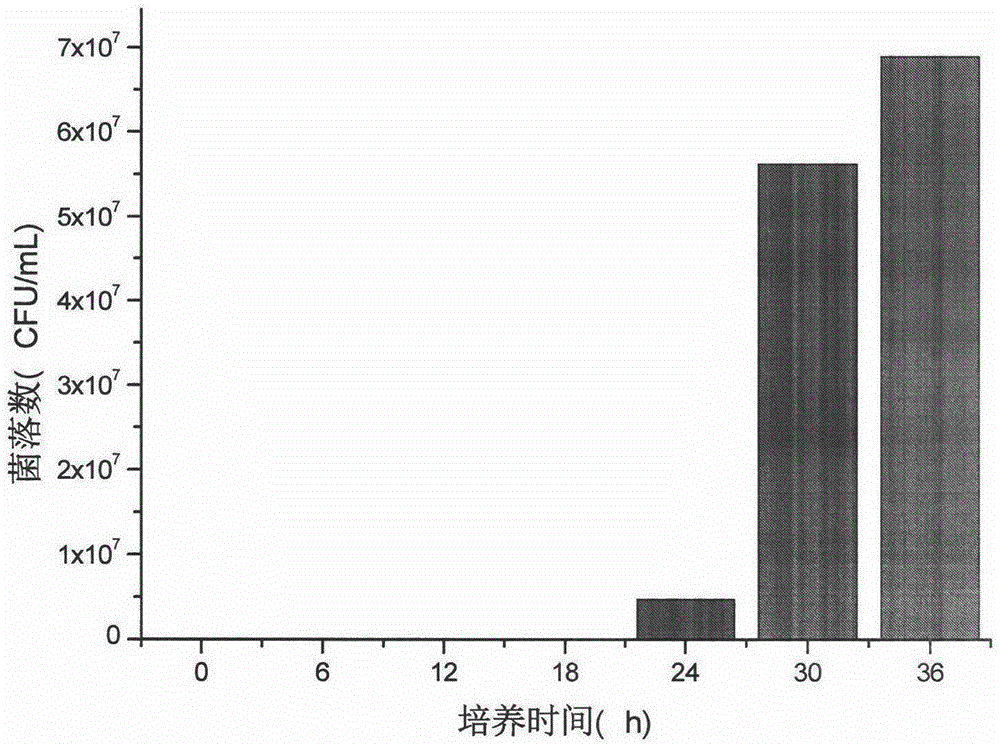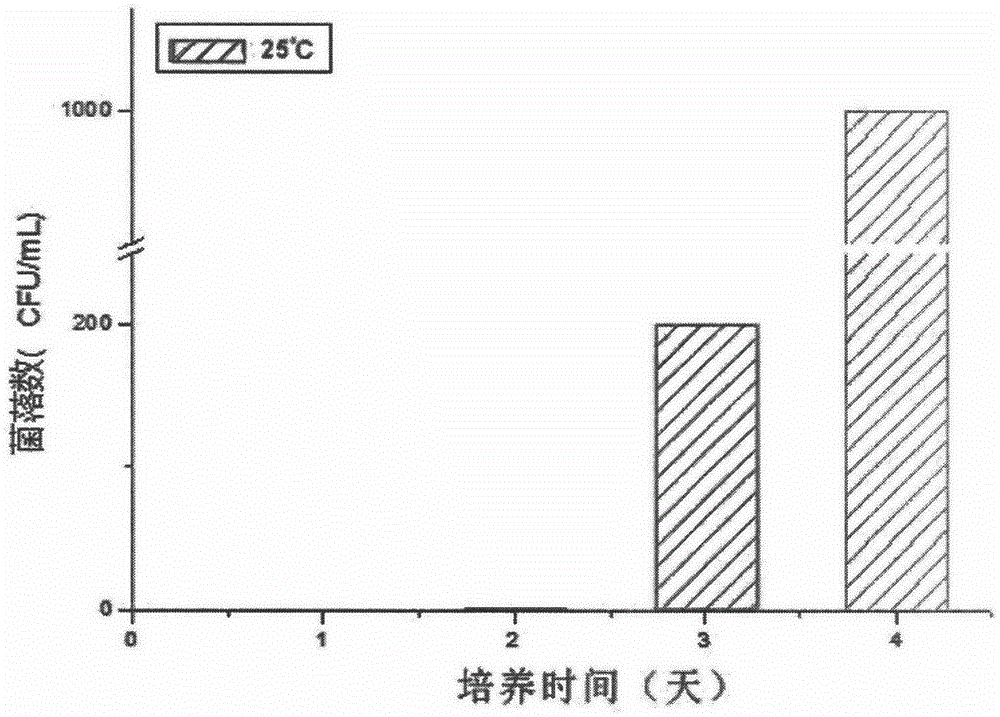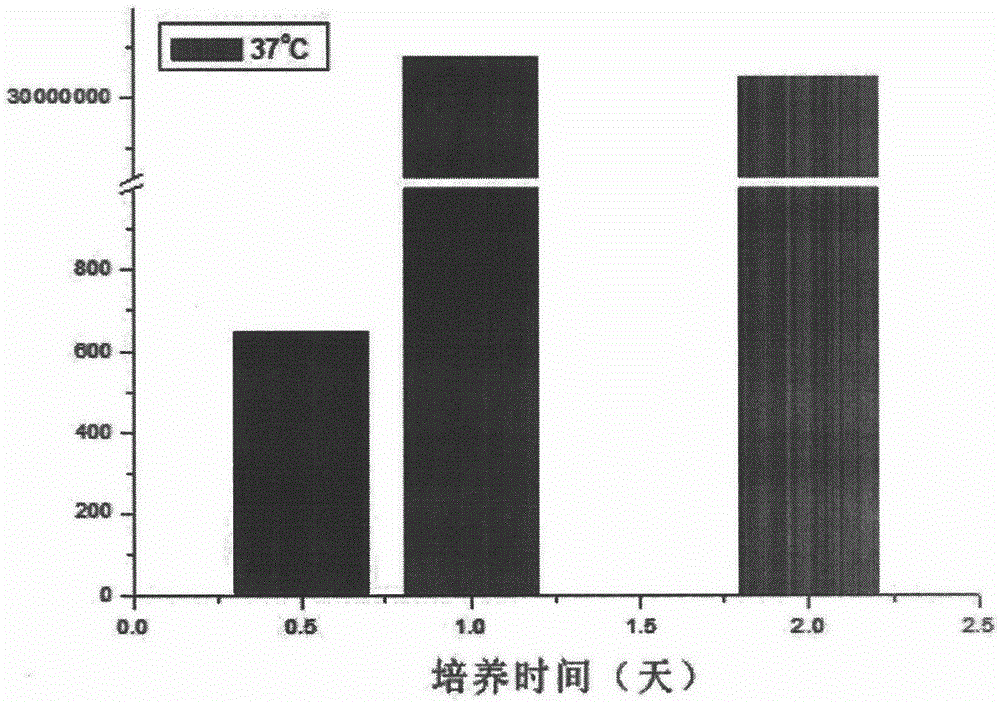Inductive formation method for VBNC (viable but nonculturable) salmonella
A Salmonella, state technology, applied in the field of food microbial cultivation and detection, can solve the problems of food safety and public health safety, and achieve the effect of avoiding the risk of contamination
- Summary
- Abstract
- Description
- Claims
- Application Information
AI Technical Summary
Problems solved by technology
Method used
Image
Examples
Embodiment 1
[0023] Example 1: Ultrasonic heat treatment is used to induce Salmonella typhimurium in BPY medium to enter the VBNC state
[0024] Take the number of cultivable bacteria as 10 7 ~10 8 CFU / mL of Salmonella typhimurium (strain number CMCC50115) BPY culture medium suspension 60 mL was aseptically transferred to a jacketed beaker. Connect to the circulating water bath device and set the temperature at 52°C. Equilibrate for 5 minutes, so that the temperature of the BPY bacterial solution in the center of the jacketed beaker is 52°C. Immediately turn on the ultrasonic device, using 190W power. Ultrasonic heat treatment for 20min. Remove the sample and cool to 4 °C.
[0025] Mix the Salmonella suspension before and after treatment evenly with a vortex mixer, take a sample by sterility test, and evenly spread it on an SS agar plate, place it upside down in a biochemical incubator, and incubate at 37°C for 24 hours. Salmonella colony growth, it is preliminarily believed that it ...
Embodiment 2
[0026] Example 2: Ultrasonic heat treatment is used to induce Salmonella typhimurium in bayberry juice to enter the VBNC state
[0027] Take the number of cultivable bacteria as 10 7 ~10 8 CFU / mL of Salmonella typhimurium (strain number CMCC50115) BPY medium suspension 60mL, centrifuged at 6000rpm for 5min, collected the bacterial sediment and transferred it to a jacketed beaker filled with 60mL bayberry juice after sterilization . Connect to the circulating water bath device and set the temperature to 45°C. Balance treatment for 2 minutes, so that the temperature of the bayberry juice bacterial liquid in the center of the jacketed beaker is 45°C. Immediately turn on the ultrasonic device, using 190W power. Ultrasonic heat treatment for 28min. Remove the sample and cool to 4 °C.
[0028] Mix the Salmonella suspension before and after treatment evenly with a vortex mixer, take a sample by sterility test, and evenly spread it on an SS agar plate, place it upside down in a ...
Embodiment 3
[0029] Example 3: Resuscitation of VBNC Salmonella typhimurium
[0030] Take 10 mL of the BPY bacterial solution that entered the VBNC state in Example 1, and centrifuge at 8000 rpm for 5 min. Rinse the bacterial cells twice with sterilized physiological saline, and finally suspend the bacterial cell pellet in 10 mL of sterilized BPY medium, and incubate at a constant temperature of 37°C and 200 rpm for 36 hours. Take 100 μL of the resuscitated bacteria solution and spread it evenly on the SS agar plate, place it upside down in the incubator, incubate at 37°C for 24 hours, and record the number of viable Salmonella bacteria after the resuscitation according to the colony counting method. The results are shown in figure 1 .
PUM
 Login to View More
Login to View More Abstract
Description
Claims
Application Information
 Login to View More
Login to View More - R&D
- Intellectual Property
- Life Sciences
- Materials
- Tech Scout
- Unparalleled Data Quality
- Higher Quality Content
- 60% Fewer Hallucinations
Browse by: Latest US Patents, China's latest patents, Technical Efficacy Thesaurus, Application Domain, Technology Topic, Popular Technical Reports.
© 2025 PatSnap. All rights reserved.Legal|Privacy policy|Modern Slavery Act Transparency Statement|Sitemap|About US| Contact US: help@patsnap.com



